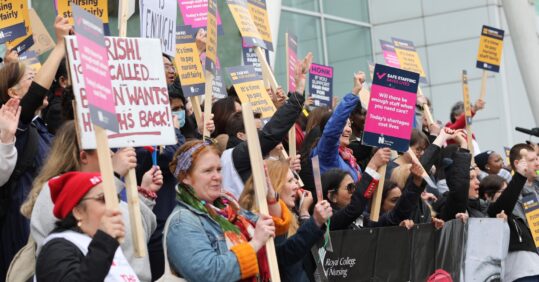Government shoots down RCN bid to reopen NHS nurses’ pay talks

The Royal College of Nursing (RCN) has received short shrift by the government over a call to reopen negotiations on the pay of NHS nurses.
Pat Cullen, RCN general secretary and chief executive, wrote to Victoria Atkins, the new health and social care secretary, urging her to commit to ‘getting round the table’ to ‘see a fair and reasonable solution’ to the union’s ongoing NHS pay dispute.
However, a subsequent statement from the Department of Health and Social Care (DHSC) flatly dismissed the prospect of further negotiations.
In what RCN described as a ‘strongly worded letter’, Ms Cullen had already expressed ‘extreme disappointment’ over the government’s ‘unwillingness’ to engage in further negotiations following the pay settlement in May, despite the RCN remaining in formal dispute.
Related Article: New preceptorship package for social care nurses
The implemented deal for NHS workers saw nurses given a one-off payment between £1,655 and £3,789 for 2022/23 and a 5% consolidated (permanent) pay increase for 2023/24. However, RCN members had voted against the offer despite other unions accepting it.
The RCN’s latest demand for negotiations follows a government pay offer to consultants, which the British Medical Association said included a total investment of 4.95% that will be used to reform the pay scale structure for the profession.
Earlier this week, the RCN said the consultants’ offer would ‘ignite fury’ among its members and make further nursing strikes more likely.
According to the union, the government pledged to explore a separate nursing pay spine in previous negotiations, but progressing the commitment ‘hasn’t received the urgency it needs’.
In response to Ms Cullen’s letter, a DHSC spokesperson said: ‘We hugely value the hard work of NHS nurses and that is why we provided a 5% pay rise. We also provided two significant non-consolidated awards, which for nurses at the top of Band 5 was over £2,000, equivalent to an extra 6.1% of their basic pay.
‘This deal was accepted by the NHS Staff Council and we continue to work collaboratively, including with the RCN, to deliver a series of agreed reforms but we will not be reopening negotiations on pay.’
Regarding the government’s offer to consultants, the spokesperson said it included ‘significant reform for a pay scale that has not been modified since 2003’.
Related Article: Applications to study nursing in England at ‘new low’
The government’s refusal to reopen pay negotiations is the latest setback for the RCN in its ongoing dispute. In June, the union failed to secure a new mandate for further NHS nurse strikes in England after the ballot turnout fell short of the 50% statutory minimum.
However, in her letter, Ms Cullen pointed out to the health secretary that 100,000 of the union’s members in England voted in favour of continued strike action, which was ‘a clear indication that the profession continues to feel undervalued’.
Ms Cullen said that while the government’s engagement in meaningful negotiations with other trade unions represented ‘a step in the right direction’, the announcement about consultant pay will have done nothing to quell unrest among nursing staff.
‘It is time for nurses and nursing to be treated with the respect they deserve and for nursing pay also to be reformed,’ Ms Cullen commented. ‘Nursing is one of the most diverse and female-dominated professions within the public sector, and the injustice of nursing pay is also a gender issue.’
Last week, the RCN claimed it had been ‘misled’ about how the Strike (Minimum Service Levels) Act would be applied to the nursing profession. The union said the legislation, which received royal assent on 20 July 2023 – would see nurses forced to work during strike action or face the sack.
Related Article: Paul Rees appointed as permanent NMC chief executive and registrar
In her letter to the health secretary, Ms Cullen wrote: ‘The government should invest less time and attention in its attempt to impose draconian anti-strike laws on nursing staff and get back around the table and discuss nursing pay.
‘Every slight discourages another individual from choosing nursing as a profession and puts more patients at risk. The NHS requires the stability of a nursing foundation and now more than ever, this must be resolved.’

See how our symptom tool can help you make better sense of patient presentations
Click here to search a symptom




